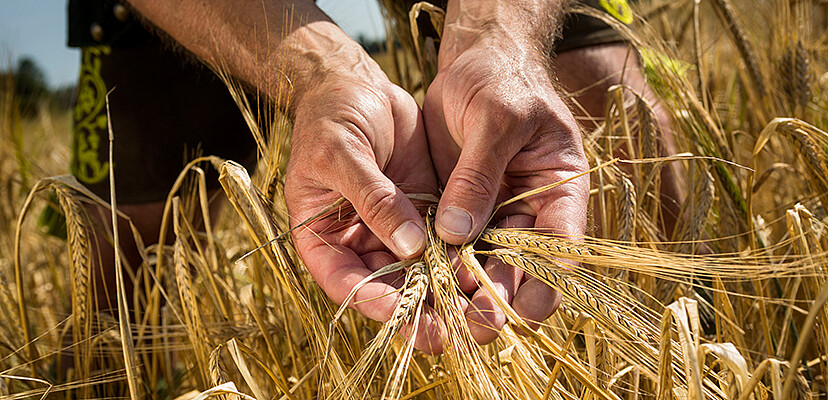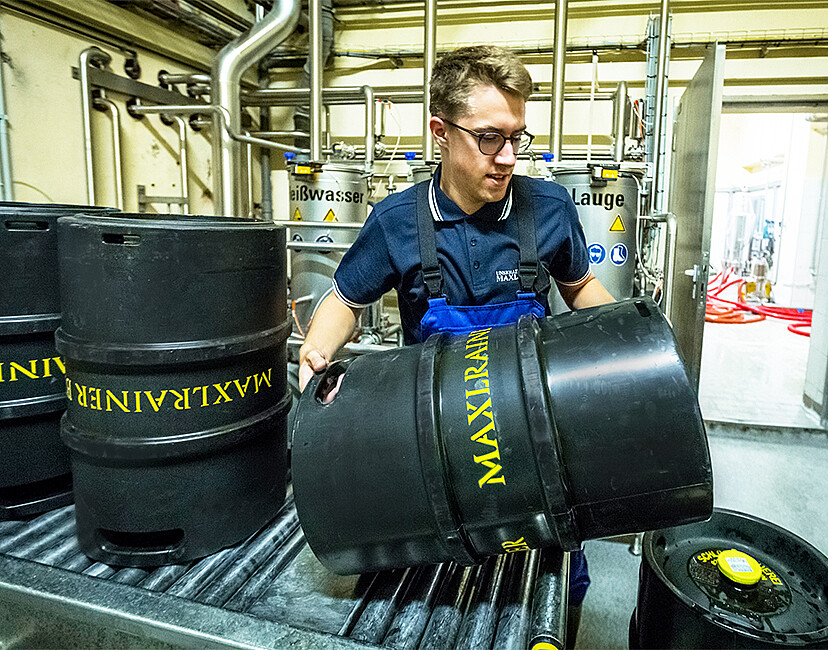Stories
In the 1970s, the first metal KEG made its debut on the beverage packaging stage. Today, it’s true to say that more or less all the world’s draught beer is contained in stainless steel KEGs. Sharing responsibility for this triumph are also numerous innovations, such as fittings and spears, and of course, stainless steel itself. The most significant benefits lie in the KEG’s durability, industrial filling and hygienic cleaning. This enables beer quality to be guaranteed, even after filling. The private brewery “Schlossbrauerei Maxlrain” prefers to export its beer specialities in resource-friendly, weight-optimised ECO KEGs from SCHÄFER Container Systems. Contrary to the current trend in beer exports, the export share of the upper Bavarian Maxlrain brewery is rising continuously.
On the global market for alcoholic beverages, beer remains the most important segment, both in terms of volume and sales revenues. In contrast to other market segments, however, it’s already quite concentrated, as the five biggest companies account for about 60% of the total worldwide volume.
This doesn’t seem to be having any detrimental effect on export growth for breweries in the SME sector. Traditional breweries in particular, which focus on craftsmanship and premium quality, can achieve two-figure annual growth rates. The largest buyer market is Italy, which accounts for over a fifth, followed by China with around a ninth.
According to the Federal Office for Statistics (Destatis), beer exports by German breweries to markets outside the EU have speeded up in recent years. And the German Brewers Association also says that “The Asian market in particular, has become significantly more important for Germany’s brewers”.
According to the Association, the export goal for German brewing businesses is to break through the 20% mark. This would mean that soon every fifth beer brewed in Germany would be drunk abroad.
One reason for this is Germany’s purity laws, which still limit brewing to the four natural ingredients of water, malt, hops and yeast. Though this may make production more complicated than in foreign breweries, the quality remains constantly high.
Our raw materials are sourced exclusively in Bavaria and they have to meet the highest quality standards. That’s why we’ve been following a strategy of controlled contractual cultivation since 2013,” enthuses Josef Kronast, first master brewer and technical manager of the upper Bavarian Schlossbrauerei Maxlrain GmbH & Co. KG. Anonymous purchases are taboo. Barley, wheat and the malt produced from them are purchased exclusively in Bavaria, regardless of the climatic conditions in the year of cultivation, rather than buying them anonymously from areas with more favourable climates.

To this end, contracts were made directly with local farmers, who grow old varieties of brewing barley exclusively for the Maxlrain brewery. There was not a single crop field that brewery owner and managing director Dr. Erich Prinz von Lobkowicz had not inspected together with his master brewer Josef Kronast. This made the relationship with the suppliers especially close and long-lasting.
“That also belongs to the art of good brewing“, says Josef Kronast. But the pre-conditions for this are field selection according to soil quality, the seed material used and the timing of both sowing and harvesting. “The hops we use prefer a cool, damp climate and come from Hallertau in Bavaria, even in warm, dry years”, Kronast continues.
The Maxlrain brewery’s only hop grower is Toni Wittmann, who was recommended by the IGN, the community of quality hop growers in Niederlauterbach. Since 2019, Toni Wittmann has been supplying Maxrain’s entire demand for hops. Maxlrain has its “own” hops field, so to speak, giving it complete insight into the crop’s cultivation, including detailed information on soil conditions and drip irrigation.
The brewery’s own well in a drinking water protected area supplies it with brewing and drinking water. “Beer is 93% water, after all”, explains Josef Kronast, and is therefore extremely important for the quality and flavour of the beer.
So, every single one of the brewing ingredients actually comes from Bavaria. The only non-Bavarian contribution is the packaging. Maxlrain’s preferred choice for their export business, ECO KEGs from SCHÄFER Container Systems, come from the Siegerland, a region in south Westphalia. The fact that the same level of care is taken in the selection of containers and their suppliers as in all other areas of the brewery’s operations is no coincidence: it’s down to the company motto “Highest Quality”.
However, Maxlrain doesn’t actually brew any of their special long-life beers especially for the export business, they are only bottled for export. Consequently, the shelf life of the exported beer is influenced significantly by the packaging, in other words, the KEGs. But, filing beer into KEGs wasn’t always the preferred approach. The stainless steel containers first had to work hard to impress beverage producers. Little by little, their reputation gradually improved until the KEGs finally achieved their current level of popularity.
Among the first breakthroughs on the road to this popularity was the industrial mass production of the first KEG with stainless steel liners and insulating polyurethane coatings (PU coating) in 1978, the new safety standard achieved by the addition of a safety bursting point in 1985 and the CFC-free production of the PU coating in 1990. Since then, Maxlrain has put its faith in SCHÄFER Container Systems. Today, the brewery’s KEG pool also includes PLUS and ECO KEGs. And many of the KEGs from their very first purchase are still in use today.

Further benefits are also provided by the increasing branding possibilities. KEGs have a great range of options for raising both brand presence and awareness, such as various labelling or inscription processes and coloured design elements. Some of these techniques, however, like in-mould labelling or the electrochemical signature of the stainless steel liner using electrolyte solutions and low voltage electric current, are simply not possible on traditional wooden barrels.
One factor that has increased the popularity of reusable staginess steel KEGs in recent years is their sustainability. On average, the KEGs are used for 30 years at four cycles a year. This multiple use results in significantly lower CO2 emissions than those generated by the production of new, disposable containers. At the same time, they are 100% recyclable. In addition, the cost per beer dispensed for a 30-litre KEG, for example, is only one twentieth 20th of that for a plastic KEG, despite the higher initial acquisition costs.
With this idea of saving resources and supplying a more sustainable product in mind, SCHÄFER Container Systems developed an up to 36% lighter ECO KEG in the year 2000 simply by reducing material input. For filling volumes from 5 to 58 litres, the company also offers special coloured polypropylene (PP) top and bottom rings, which have also been DIN standardised for some time now. The shock absorber effect they provide prevents damage to the ECO KEGs and makes them stackable with other KEG types. Besides this, the PP rings also provide branding potential through their individual colours.
This has not only created a new product family but, due to the weight reduction, a significant logistics benefit, as well: a standard 40-foot container can now take up to 6% more full KEGs on board.
For Maxlrain, this improvement in SCHÄFER ECO KEGs’ transport density has become indispensible for their export business. “An increasing proportion of our beer is being exported – to South Tirol, Milan, Naples, Trieste, and even to Moscow and China, even though we’re not actively promoting exports sales,” says Josef Kronast.
Maxlrain’s entire export business is based on recommendation and the constantly high brewing quality. “We’ve no sales agents abroad and yet our exports are steadily increasing year by year,” the master brewer reveals. He sees the explanation in Maxlrain now being among the most highly decorated award-winning breweries in Germany. Twice in recent years – the last time in 2016 – they’ve received the Federal Food Ministry’s German brewery of the year award in gold, three times in silver and seven times in bronze.
In fact, since 2008 the Maxlrain’s craft brewing operations have been receiving this federal ministerial prize with almost habitual regularity – in 2019 for the 12th time in succession. No other brewery in Germany has received the award more often. All beers submitted to the German Agricultural Society (DLG) in the last 12 years have achieved the Gold classification.
With this in mind, the sales department works extremely carefully: “A series of visits mutual by to the customer’s premises and customers to the brewery determines whether we suit each other. The ultimate goal is that a beer dispensed in Naples can be enjoyed with the same flavour as in our own “Bräustüberl” (the brewery bar), is how first master brewer and technical manager Josef Kronast explains the philosophy of family entrepreneur Dr. Erich Prinz von Lobkowicz: “If the interpersonal chemistry and the business conditions are right, we like to make long-term commitments to our customers, preferably over decades.”
The practical and economic benefits of multi-purpose KEGs have made them indispensible to breweries. The cost-benefit ratio of KEGs made of stainless steel is many times superior to that of other packaging forms. Equally, the long service life of stainless steel KEGs makes them the ideal solution when aiming for sustainability. For beer exports, weight-optimized stainless steel KEGs enable greater load volumes to be transported while guaranteeing reliability for both product and quality. For the economic success of small and medium-sized craft breweries, these benefits can be decisive.